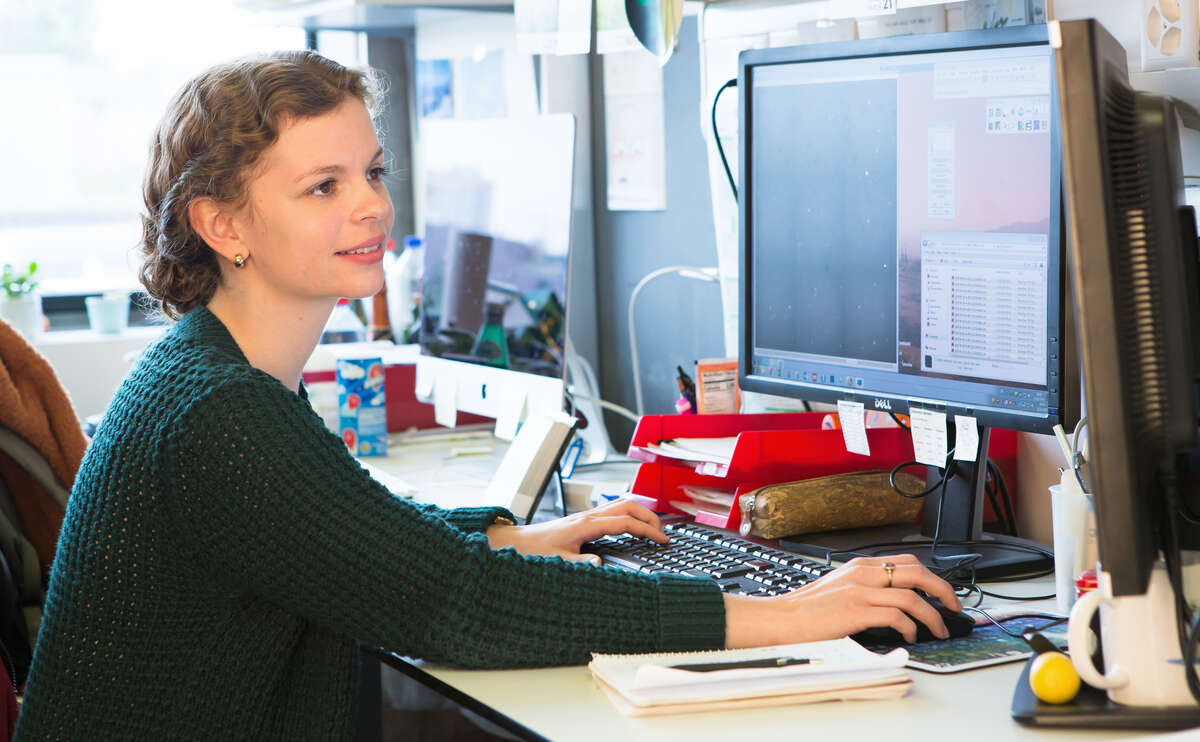Interview with Fabienne Estermann
Good time management is very important to her. Not only because Fabienne Estermann, who is doing her Master's degree in infection biology in Prof. Urs Jenal’s lab, commutes for more than two hours daily but also because, in addition to her studies, she is actively involved in the Biology student’s organization, the Summer Research Academy for high school students and in scientific communication.

Why did you decide to study molecular biology?
Plant and animal biology already fascinated me in primary school. In high school, I also became interested in chemistry and so it was clear to me from the very beginning that I would go in the direction of molecular biology.
How did you choose your research group for your master's thesis?
For me, the block courses in my third bachelor year were extremely important. This was the first moment when you get out of the lecture hall and into direct, personal contact with the researchers. I talked to a lot of assistants and professors throughout the block courses in order to find out what they were actually doing in their everyday work and I also looked at many labs. And so, it finally became infection biology.
How did you come up with your research subject?
In a way, together with the group. In conversations with the assistants, it quickly became clear where I was being drawn into and in which direction it might go. Then with my supervisor, I looked at what my predecessor had done and how we could continue this, to carry out a meaningful project within the limited time.
What is your research about?
I am working with Pseudomonas aeruginosa, a hospital germ that is spreading rapidly due to its resistance to antibiotics and is classified by the WHO as one of the three "priority 1" pathogens for which new antibiotics are urgently needed. I am investigating how Pseudomonas behaves on surfaces and how it colonizes different areas, i.e. whether it lands and then leaves again, or whether it stays and how it makes this decision.
How are you progressing with your experiments?
At the beginning, it was very overwhelming, as everything was new and the experiments don’t just work like in the block courses. Therefore, you still need a lot of help. But the longer, the freer you become. With time, my supervisor, Benoit Laventie, is trusting me more and more and knows that I am doing what I am supposed to do. And so, I have now also started to think about strategies for experiments on my own and then discussed these with Benoit.
Where do you get your ideas?
My colleagues give me much input. This is really cool. Firstly, there are weekly meetings, where we regularly present our research projects in turn, and the postdocs and PhD students, who have been doing this for quite some time, tell you to try this or that. I also still discuss a lot with my former bachelor’s colleagues. Communication on all levels is extremely important. Then on Mondays and Wednesdays, we have seminars, alternating between speakers from all over the world and people from our floor, i.e. infection and microbiologists. I also read many papers and, of course, there are the lecture series.
How do you choose your lectures?
From the point of view of what I enjoy most and what I personally need right now. For example, I have now done a programming course on data processing because with my microscopy work I am quickly producing large datasets. That helps me a lot. And at the Imaging Core Facility I did a microscopy course, simply because it's great to look at things you don't otherwise see.
What’s the workload?
For me it’s a normal job. I am here from 9 am to 6 pm. As I commute for one hour twice a day between work and home, I have to have a clear time management. It can happen that I come on a Sunday, to get my cultures going, so that I can do my experiments on Monday. But this is rather an exception. Our group’s credo is to feel good and stay well balanced because this way you definitely work better.
Are you involved in other activities?
For three years, I have been part of the Biology students’ organization and am responsible for establishing the website. More recently, I have become interested in scientific communication and participated in an Exposure Sciences Film Hackathon. It was an incredibly enriching experience to learn how you need to break down everything and concentrate on the fundamental principles, in order to make science understandable and accessible for a wide audience. In the summer, I assist at the Research Summer Academy, a two-week course for high school students. I often work together with young people and it’s lots of fun.
Do you have a tip for prospective master students?
Two, actually. It is extremely important that you choose something you enjoy doing and not only for the sake of your CV, otherwise it can leave you very frustrated. And you should absolutely use the block courses to speak with as many people as possible, to find out which direction is the right one and also to see if you like a particular group. After all, you will be working closely together for one and a half years.
Do you already have plans for the time after your master?
At the moment, I am looking for an internship in industry, even though I feel very happy in my job and would like to do a PhD later. But now I first have to get out of school and academy and into industry because I have no idea what the everyday life of a scientist in industry is like and that’s what I want to find out next year.


